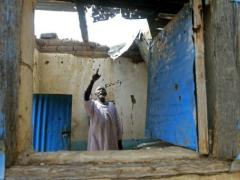CAIRO: Faced by angry street protests, Egypt’s military rulers are under fire from all political sides and are locked in their worst crisis since the fall of Hosni Mubarak, ahead of next week’s crucial polls.
In a bid to defuse the crisis and contain the clashes, the ruling Supreme Council of the Armed Forces (SCAF) began an emergency dialogue with a number of the country’s political forces following a cabinet resignation.
Prime Minister Essam Sharaf’s government announced on Monday it had resigned "owing to the difficult circumstances the country is going through" — but the resignation has yet to be accepted by SCAF.
Sporadic clashes continued on Tuesday for a fourth day running between police and protesters demanding democratic change with a mass anti-military rally scheduled for Tuesday afternoon.
The military council, which vowed to put the country on the path to democracy after it took over in February, is accused of seeking to embed itself in power and to perpetuate the former regime’s repressive system.
"The SCAF was considered as the protector of the revolution, but it has become a burden on the revolution," columnist Fahmi Howeidi wrote Monday in the independent Al-Shoruq daily.
Nevine Mosaad, professor of political science at Cairo University, said the current crisis is the worst in 10 months.
"It is a direct challenge to the military council and its leadership," she told AFP.
Arab League chief Nabil Al-Arabi has expressed "great concern" and called for maintaining a "political process to move towards democratic change" in line with the demands of Egypt’s revolt.
The developments have overshadowed preparations for November 28 parliamentary elections, the first since protests ended Mubarak’s 30-year rule in February, paving the way for the military to cede power to a civilian authority.
"If the polls are held as scheduled, they will take place in a climate of crisis," said Mosaad.
For political analyst Mustafa Kamel Al-Sayyed, a political consensus among Islamists, liberals and leftists on supporting the military has been shattered.
"The military council is facing opposition from all forces that took part in the revolution," he said.
Several politicians, including former head of the International Atomic Energy Agency (IAEA) Mohamed ElBaradei, have renewed their calls for a "government of national salvation."
They have urged the military to review its plans to develop a precise timetable for the transfer of power to civilians, by organizing a presidential election before the parliamentary polls.
But the Muslim Brotherhood, highly critical of the military rulers, are against any postponement of the legislative elections as they feel they are in a strong position.
In response, the SCAF has renewed its commitment to hand over power to a democratically elected civilian authority once a president has been voted in, but it has not specified a date.
"The parliamentary elections scheduled for next week are the first step in this process," the military council said on Sunday night, suggesting that delaying the polls was not likely.
Egyptians applauded the military for not suppressing the revolt against Mubarak earlier this year, but now the honeymoon is well and truly over in the face of unmet promises and a worsening economic crisis.
Thousands of people packed Cairo’s Tahrir Square again on Tuesday calling for the removal of the military rulers. They greeted news of the resignation of the civilian cabinet with indifference.
"The army gives the impression that the fall of Mubarak was the result of a coup and not a popular revolt," Mosaad said.


